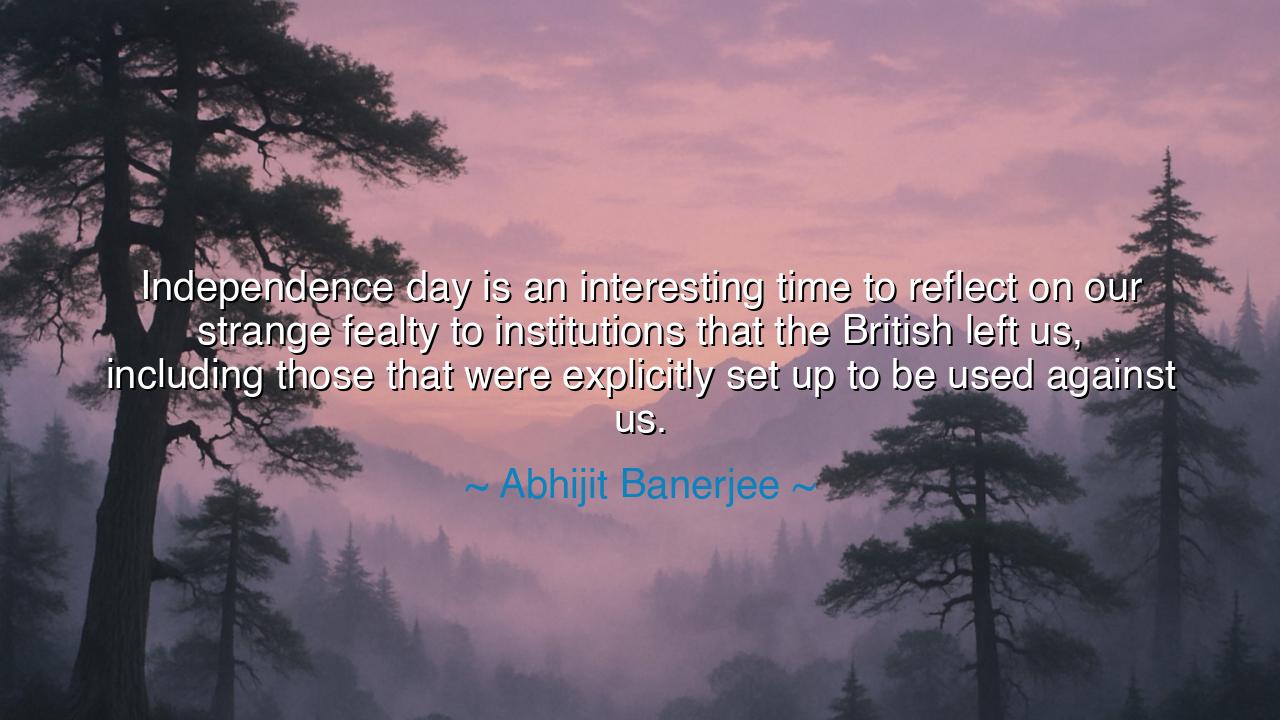
Independence day is an interesting time to reflect on our strange
Independence day is an interesting time to reflect on our strange fealty to institutions that the British left us, including those that were explicitly set up to be used against us.






There are moments in the life of a nation when it must pause — not to celebrate, but to reflect. When Abhijit Banerjee said, “Independence Day is an interesting time to reflect on our strange fealty to institutions that the British left us, including those that were explicitly set up to be used against us,” he was not questioning the glory of freedom, but the depth of its meaning. His words carry the wisdom of a philosopher and the sorrow of a historian. They ask a piercing question: if we have shed the rule of the coloniser, why do we still live under the shadow of his systems? Have we truly become free — or have we merely changed the faces of power while keeping its chains?
In this reflection lies a hard truth. When the British Empire withdrew from India, it left behind not only railways and courts, but institutions of control — laws, bureaucracies, and habits of obedience designed to rule, not to serve. These institutions, once the instruments of domination, were built to command rather than to uplift. Yet after independence, the newly free nations — not only India, but many across Asia and Africa — continued to bow before these same structures, as though their legitimacy were sacred. Banerjee calls this a “strange fealty”, for it is the devotion of the freed to the memory of their captor.
To understand this, one must look not merely at governments, but at the colonial mind. It is one thing to win political independence; it is another to win intellectual and spiritual freedom. The British may have left their offices and flags, but their values of hierarchy, centralisation, and control seeped deep into the bones of governance. The colonial state was never built to listen — it was built to command. It saw citizens not as participants, but as subjects. And long after the colonisers departed, many nations continued to wield power in that same spirit. Thus, Banerjee’s words are not an accusation — they are an invitation to wakefulness, to examine whether freedom has truly entered our institutions, or only our ceremonies.
History offers countless examples of this unfinished liberation. Consider the story of post-revolutionary France. When the monarchy fell and liberty was declared, the new rulers promised equality and justice. Yet within a decade, Napoleon crowned himself Emperor, and the machinery of autocracy — only recently dismantled — rose again, dressed in new rhetoric. The lesson is eternal: power, once shaped by tyranny, must be reshaped by conscience, or it will continue to rule in the old ways, no matter whose hand holds the reins. So too with nations once colonised — if they do not reform the systems built to control them, they remain captives in all but name.
Banerjee’s insight, though rooted in India, speaks to all people who have inherited structures of oppression disguised as order. To honour independence, one must not only remember the freedom won, but confront the legacies that still constrain it. It is not enough to raise new flags over old fortresses — one must tear down the fortress itself. The laws that silence dissent, the bureaucracies that stifle creativity, the schools that reward obedience over thought — these are the quiet remnants of empire. They do not wear crowns or uniforms, yet they govern hearts and minds. To challenge them is the true labour of independence.
But there is also hope in his words, for reflection is the beginning of renewal. The same institutions that once served conquest can be reborn through reform and conscience. The pen that wrote decrees of subjugation can now write charters of justice; the courts that once punished protest can now defend liberty. The key lies in reclaiming their spirit, in infusing them with the values of democracy, compassion, and equality. For institutions, like people, are not evil by nature — only by purpose. When their purpose changes, their soul is transformed.
So, my child, remember this teaching: independence is not an event but a process, not a date upon a calendar but a discipline of the heart. It must be renewed each generation, not by words alone, but by the courage to question what we inherit. Celebrate freedom, yes — but also examine it. Ask whether your schools teach you to think, or to conform; whether your leaders serve, or command; whether your institutions uplift, or oppress. For as Banerjee reminds us, the truest form of independence is not the freedom from another’s rule, but the freedom from another’s design. Only when a people rebuild their systems in their own image can they truly say: We are free.






AAdministratorAdministrator
Welcome, honored guests. Please leave a comment, we will respond soon